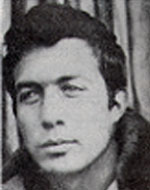Uri, son of Sarah and Avner, was born on June 5, 1949 in the Kinneret colony and is the third generation of the Moshava, and completed his studies in Kvutzat Kinneret near the settlement. After completing his high school studies, He was a member of the Jordan Valley sailing club, played basketball and was also interested in tennis, and he was always outstanding in his self and as a child saw him as a “type.” His Yaffa face was grave And when he smiled, he had a great deal of innocence in his smile, and Uri was very honest, deeply attached to the ground, very attached to it, and with great love for the land, He liked to sail alone on the Sea of Galilee in a sailboat and was able to take control of the volatile waters of the lake and to forbid his desire for the changing spirit, and his friends testified that his quiet and restrained nature was largely shaped by the sailing he loved Uri was drafted into the IDF in early August 1967, Was assigned to the Ordnance Corps. But after completing his basic training, he completed a paratroop course and a platoon commander’s course, and in April 1969 he was sent to a course for infantry officers, after which he completed a course for officers in the IDF. The praise. Uri volunteered for action in Karameh and participated in many daring battles, but modest and his friends were unable to extract stories about these actions. When they asked him the same thing, he shrugged and dodged. The opinion given by his commanders prior to the liberation was: “An exemplary officer and commander, who fulfilled his duties in the best possible way, serves as a personal example of his subordinates and commanders.” His technical knowledge was also mentioned in the opinion of the commanders. At the beginning of October 1970, Uri was released from regular service, returned to the colony of Kinneret and established his home there. He loved the work of the land with all his Lev, as he said: “I feel that I want to work the land with physical hands, I feel that I really love the land and I can not break away from it.” In 1972 he joined the “Egged” cooperative in Tiberias and moved with his wife and toddler to live in the city. But he always said: “A day will come when I will return to be a farmer and I will live in the Kinneret.” Anyone who did not know Uri Makarov could not have imagined that the “fighter” had such a deep love for the peaceful work of the land. “I want to raise my own plants in the ground with my own hands, and here I was born and raised here, I am connected to a place like the roots, and this is my place and I want Tzur (the son) to grow here as well.” Uri was a dedicated and loyal member of the “Egged” branch in Tiberias. He fulfilled his task with great devotion and dedication. When the Yom Kippur War broke out, Uri was called to a branch that was on alert. He kept calling his unit until he got the longed-for connection. Then he blurted out “Hello and goodbye” and did not join his unit. He concentrated his men and went down with them to Ras Sudar, and at the head of his unit was caught up in fierce battles against the Egyptian forces. In one of the battles, on October 15, 1973, Uri went out alone to inspect the area, where he encountered an enemy ambush and fell into a void. He was brought to eternal rest in the Kinneret cemetery. He left behind a wife and son, parents, two brothers and two sisters. After his fall, he was promoted to captain. “Thanks to these wonderful young men like Uri, it will be possible to continue raising proud and upright sons, who do not take their heads off, are not afraid – they will not hesitate to fight in a stormy sea of hostility around us.” She added: “Faith must strengthen you as parents, because you have raised a son of glory, who did not disappoint in the days of Sa’ar and test.” In his letter to the grieving family, the defense minister also noted the character and activities of O.As an exemplary parachutist, who had the ability to train and act, and led his subordinates wisely and bravely. Uri’s memoirs were published in the book “Our Friends” published in memory of the fallen “Egged”, the journal “Jewish Agency” and the booklet published in memory of the people of the Jordan Valley and Golan Heights, who fell in the Yom Kippur War.
